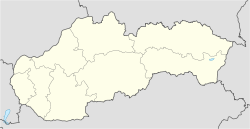Borša
Borša
Borsi | |
|---|---|
village | |
 Rakóczi castle of Borsa | |
 Borša Location of Borša in Slovakia | |
| Coordinates: 48°23′43″N 21°42′30″E / 48.39528°N 21.70833°ECoordinates: 48°23′43″N 21°42′30″E / 48.39528°N 21.70833°E | |
| Country | Slovakia |
| Region | Kosice |
| District | Trebišov |
| First mentioned | 1221 |
| Government | |
| • Mayor | Anna Tünde Vargová since 2018; Independent |
| Area | |
| • Total | 9.54 km2 (3.68 sq mi) |
| Population (2005) | |
| • Total | 1,240 |
| • Density | 130/km2 (340/sq mi) |
| Time zone | UTC+1 (CET) |
| • Summer (DST) | UTC+2 (CEST) |
| Postal code | 076 32 |
| Area code(s) | 528170 |
| Car plate | KS |
Borša (Hungarian: Borsi) is a village and municipality in the Trebišov District in the Košice Region of eastern Slovakia. The village is famed as the birthplace of Francis II Rákóczi.
History[]
In historical records the village was first mentioned in 1221. Borša is the hometown of Francis II Rákóczi who was born here on 27 March 1676.
Rákóczi's castle in the village is being under reconstruction since 2018, serving as a museum.[1]
Geography[]
The village lies at an altitude of 102 metres and covers an area of 9.54 km². It has a population of about 1250 people.
Ethnicity[]
By the beginning of 20th century, the village had an absolute Hungarian majority. In census of 1910 during the period of Magyarization, the village had 783 inhabitants, of which 778 were Hungarians.[2][3]
In the most recent Slovak census of 2011, 644 inhabitants were Slovaks (53.0%) and 545 were Hungarians (44.9%).[4]
Facilities[]
The village has a public library and a football pitch.
Genealogical resources[]
The records for genealogical research are available at the state archive "Statny Archiv in Kosice, Slovakia"
- Reformated church records (births/marriages/deaths): 1758–1924 (parish B)
See also[]
References[]
- ^ "Rákociho kaštieľ v Borši začali rekonštruovať".
- ^ "Fórum Kisebbségkutató Intézet | Fórum inštitút pre výskum menšín | Forum Minority Research Institute".
- ^ https://www.postoj.sk/53562/casy-ked-madari-a-slovaci-vypadavali-zo-statistik
- ^ https://census2011.statistics.sk/SR/V%FDchodn%E9%20Slovensko/Ko%9Aick%FD%20kraj/Okres%20Trebi%9Aov/Bor%9Aa/TAB.%20115%20Obyvate%BEstvo%20pod%BEa%20pohlavia%20a%20n%E1rodnosti.pdf
- https://web.archive.org/web/20071116010355/http://www.statistics.sk/mosmis/eng/run.html
- Surnames of living people in Borsa
- Villages and municipalities in Trebišov District
- Zemplín (region)
- Trebišov District geography stubs
